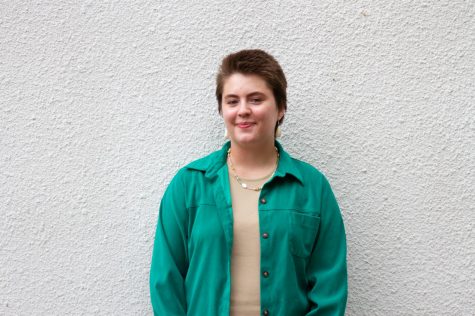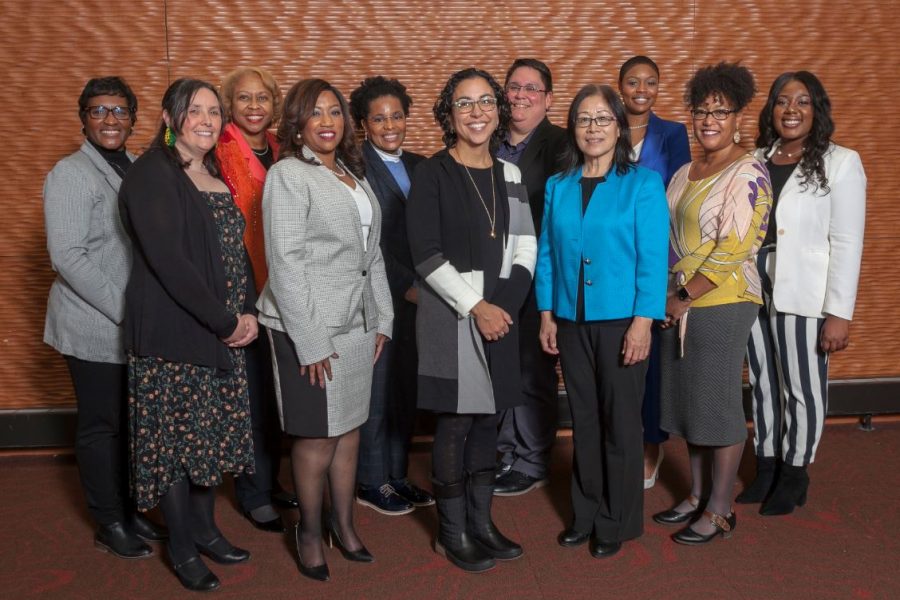‘We have to do this together’
Heather Ann Moody receives UW-System Outstanding Women of Color in Education Award
Photo by Submitted Photo
The Outstanding Women of Color in Education Award was founded in 1994 through the UW System. This award honors women of color throughout the state of Wisconsin for their leadership and contributions within their community.
Heather Ann Moody is an assistant professor of the American Indian Studies program on campus.
Through the university, Moody teaches a variety of courses in the American Indian Studies concentration, including Introduction to Contemporary American Indian Communities, which is a course she created for the university.
Moody said she values her unique connection with UW-Eau Claire, as she now works as a part of the program she graduated from on campus.
“I have actually been on campus since 2007, prior to my tenure track position,” Moody said. “I was also a student here within American Indian Studies and I currently teach for the program I graduated from, which is a really cool situation to be in.”
Moody said both her experience within the university and community of Eau Claire shapes her view on the reality of knowledge individuals have about Native American individuals.
“Most of society is really stuck with this image of American Indians from the past,” Moody said. “My goal is always to connect the past to the present and have people understand that our past really is not that long ago. Things that have happened in our past, are still affecting us today.”
According to the UW-System, the Outstanding Women of Color in Education Award was founded in 1994.
The award’s mission is to honor women of color throughout the state of Wisconsin for their leadership and contributions within their community as a whole.
Moody said she was initially shocked to receive the award, as she did not even know about her nomination and the steps which followed after her nomination.
“Throughout the whole UW- System, one person is selected from each of the 13 campuses to represent outstanding women of education,” Moody said. “It is so important to recognize the people who are doing work that goes beyond teaching in a classroom.”
Rose-Marie Avin, the program director of the women’s, gender and sexuality studies at UW-Eau Claire, said said she chose to nominate Moody in order to capture the impactful work she provides to the university.
“Dr. Moody’s strength is in the amount of service she participates in,” Avin said. “Both in her department at the university but also in the community she does a tremendous amount of service. Those are the two areas where she really shines.”
Moody believes she was recognized for this award based on the additional service she does beyond UW-Eau Claire.
“I have no problem doing service,” Moody said, “it is part of my job and I think it automatically ties to my research. I want to help people do better in society — whether that is with students and helping them along the way or in our community at large.”
According to the Wisconsin Department of Public Instruction, Act 31 sets the state mandate to require instruction of tribal sovereignty, treaty rights and the culture of the 11 federally recognized tribes upon graduation.
Moody said her research background revolves around Wisconsin Act 31 and the methods to enforce this act through K-12 school systems.
“I work a lot with K-12 educators. People are really shocked that they were supposed to know this information coming into college,” Moody said.
Moody said she feels honored to represent her community across the UW education system, as she can bring awareness to the resources native students can obtain.
“Often times students feel really alone, especially students of color,” Moody said. “(I want) for students to realize we have faculty here who can help them. I am always here, and my students know that.”
Moody said she will continue to raise awareness of the experience students of color have on a college campus, especially in light of the racial events which took place this semester on the Eau Claire campus.
“This is happening to our native students every year and every semester. It is unfortunate that our students have to be affected in such a way that it finally was brought to the attention of the general public and our administration,” Moody said.
Avin said in preparation for the nomination, she was able to speak directly with the community members who Moody worked within the K-12 education system.
“She spent her entire summer helping an art teacher to develop an art unit. Usually people spend their summer in their offices doing research that nobody may read,” Avin said. “(Moody) is someone who is going to impact a lot of kids in the community. To me, that is more valuable than any publication because you are impacting people’s lives.”
As a member of the Equity, Diversity and Inclusion organization on campus, Moody often feels discouraged by the current state of the EDI program on campus and seeks change.
“We need to be much more aware of the work we are doing for EDI, not just ‘have we checked some boxes,’” Moody said. “We can have a goal and have a plan, but unless we are willing to shift resources to address EDI, we are never going to get there.”
According to Moody, the next semester on campus will involve her additional dissertation research and opportunities for the Domestic Intercultural Immersion program, led through her instruction over spring break.
Avin said the efforts Moody puts toward the Eau Claire community of color goes beyond the notoriety of this award.
She hopes both students and faculty recognize the efforts educators like Moody have to establish comfortable environments for students of color.
“Dr. Moody is a model faculty member in her dedication and willingness to provide services to both the university and our communities,” Avin said. “She gives so much of herself because it is all about the students, she wants out students to excel.”
In the future, Moody said she hopes the UW-Eau Claire will target the issues the Native American community faces on campus, along with the efforts educators make to resolve their issues.
“We need to be better,” Moody said. “We need to have these conversations. We have to do this together.”
Nelson can be reached at [email protected].

Evelyn Nelson is a third-year Journalism and Environment, Society and Culture student. This is her fifth semester on The Spectator. She enjoys fulfilling her dream of being a barista, at SHIFT Cyclery and Coffee Bar. Stop by for some great coffee and conversation!

